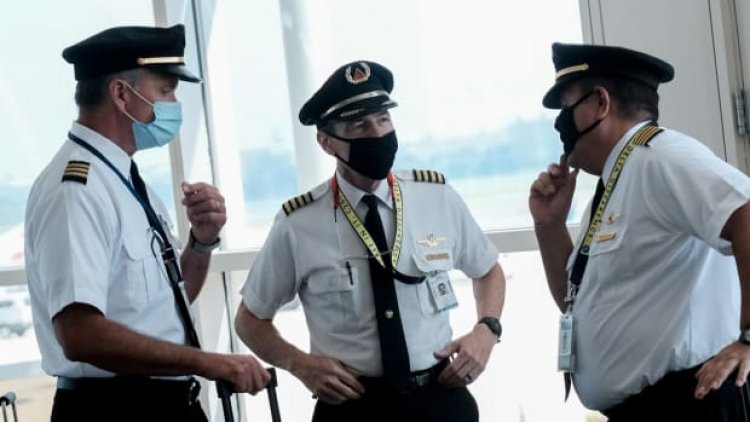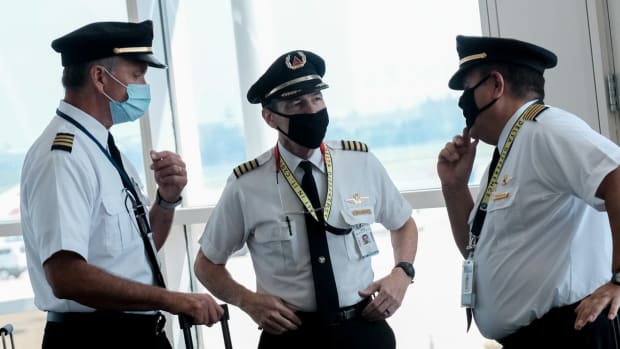Airlines Have a Problem That's Bigger Than Southwest's Woes
The aviation industry has a headache that's years in the making.

The aviation industry has a headache that's years in the making.
Companies don't want to reach some milestones and there are some records no one wants to break.
Last year, the airline industry hit a record high for flight delays and cancellations than ever before, with 100,000 flights, or 3.2% of all flights, canceled in the first part of 2022. The issue has gotten so out of control that Secretary of Transportation Pete Buttigieg has been cracking down on airlines, demanding they reimburse passengers for canceled flights in a timely manner and has been threatening further moves, such as legislation to make airlines issue vouchers with no expiration date for canceled flights.
Southwest’s (LUV) - Get Free Report recent holiday debacle, in which more than 16,700 flights were canceled or delayed during the week between Christmas and New Year’s, was both a high-profile screw up on Southwest’s part (and one that could likely been avoided), as well as the most high-profile example of a frustrating trend for the airlines.
The industry clearly has a problem right now, and there’s no easy fix in sight.
Why There Are So Many Flight Cancellations
In the case of Southwest, a major problem for the company, according to critics and the Southwest Airlines Pilots Association, is that the company’s executives didn’t want to pay to have its scheduling software updated.
But the reason nearly every airline has more cancellations than ever is that there’s not enough pilots to go around.
Even before the pandemic, the demand for global travel was outpacing the pool of available pilots. But during the pandemic, airlines became desperate to cut their costs.
Because many of them took federal aid, they were prevented from laying off or furloughing any employees. Instead, they offered a number of pilots buyouts or early retirement. Delta (DAL) - Get Free Report alone saw about 17,000 employees, or 20% of its workforce leave in this fashion.
Now there’s not enough pilots to go around, and if one pilot gets sick, there very often isn’t a back-up pilot available, so a flight gets canceled or delayed. Compounding the problem is that pilots are required to retire when they hit 65, but there’s not enough new pilots available to replace a generation that is quickly aging out of the field. There’s also not enough experienced pilots available to train the new crop.
Helane Becker, an analyst for Cowen, estimates that 10,000 pilots have left the field since the pandemic, as reported by Travel Weekly, and the government estimates that “there will be about 18,000 openings per year for airline and commercial pilots this decade…. however, the Federal Aviation Administration issued on average only half that number of pilot licenses from 2017 through 2021.”
In general, the airline industry is facing a crunch, as there’s not enough new pilots coming in to replace the ones who either have left the industry, or will do so soon. As a result, more and more planes are staying grounded.
Southwest Airlines has more than 700 planes but parks 40 to 45 of them each day because it lacks pilots to fly them, said CEO Bob Jordan at a recent media event, as noted by Travel Weekly, which points out that means 200 flights a day or up to 8% of the airline’s fleet is grounded. Michael A. McCoy/Getty
The Airline Industry Is On a Hiring Spree
In a recent earnings call, United Airlines CEO Scott Kirby said he believes that his airline, American (AAIRF) , Delta and Southwest will collectively hire about 8,000 pilots this year, up from the usual 6,000 to 7,000.
“You can't run your airline like it's 2019 or you will fail,” he said, estimating that needs 10 percent more pilots and 5 percent more planes than it had in 2019 to keep up with demand.
Airlines have come around to the reality that the only way out of this problem is to spend enough money to attract and retain pilots, as American Airlines has given pilots raises and in some cases a temporary 50% pay hike, while Alaska Airlines and United Airlines have both opened flight training schools and are offering financial aid to help defray the cost.
The natural result is that now pilots find themselves with more bargaining power than ever, as Delta pilots are currently voting on a contract that their union says would raise pay by more than 30% over four years. If accepted, it is believed that American, United and Southwest would adopt a similar pay structure.
.
What's Your Reaction?

























































